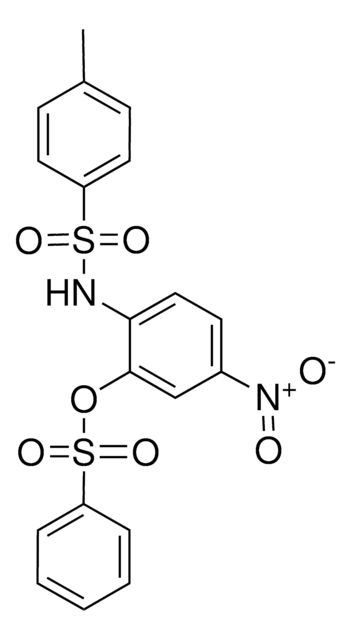S0756
Sphingomyelin
from chicken egg yolk, ≥95%
Synonym(s):
N-Acyl-4-sphingenyl-1-O-phosphorylcholine, N-Acyl-D-sphingosine-1-phosphocholine
About This Item
Recommended Products
biological source
chicken egg yolk
Quality Level
Assay
≥95%
form
powder
solubility
chloroform/methanol: soluble 50 mg/mL, clear, colorless to faintly yellow (1:1)
functional group
phospholipid
lipid type
sphingolipids
shipped in
ambient
storage temp.
−20°C
SMILES string
CCCCCCCCCCCCC/C=C/[C@H]([C@@H](NC=O)COP(O)(OCC[N+](C)(C)C)=O)O
InChI
1S/C24H49N2O6P/c1-5-6-7-8-9-10-11-12-13-14-15-16-17-18-24(28)23(25-22-27)21-32-33(29,30)31-20-19-26(2,3)4/h17-18,22-24,28H,5-16,19-21H2,1-4H3,(H-,25,27,29,30)/p+1/b18-17+/t23-,24+/m0/s1
InChI key
LRYZPFWEZHSTHD-HEFFAWAOSA-O
Looking for similar products? Visit Product Comparison Guide
Related Categories
General description
Application
- in the preparation of standard during the enzymatic measurement of plasma sphingomyelin levels
- to study the binding of Vascular Anticoagulant α (VAC α) to planar phospholipid bilayers
- to perform fluorescence polarization of PC16 (N-[α-N-palmitoyl-ε-N-(4-nitrobenz-2-oxa-1,3-diazole)-L-lysine]-2-aminoethanol-N- (trimethylaminoethanol) phosphate) in dispersions of co-sonicated lecithin and sphingomyelin
- for reconstitution of viral ion channel protein M2 into liposomes
- as a standard sample to define spectral fingerproint using Time-of-flight secondary ion mass spectrometry (ToF-SIMS)
- to evaluate the contribution of various phospholipids to the formation of foam in the amniotic fluid
Biochem/physiol Actions
Quality
Storage Class Code
11 - Combustible Solids
WGK
WGK 3
Flash Point(F)
Not applicable
Flash Point(C)
Not applicable
Personal Protective Equipment
Choose from one of the most recent versions:
Certificates of Analysis (COA)
Don't see the Right Version?
If you require a particular version, you can look up a specific certificate by the Lot or Batch number.
Already Own This Product?
Find documentation for the products that you have recently purchased in the Document Library.
Protocols
(soybean), ≥97%; L-α-Phosphatidylethanolamine from egg yolk, Type III, ≥97% (TLC), lyophilized powder; L-α-Phosphatidylcholine, from egg yolk, Type XVI-E, ≥99% (TLC), lyophilized powder; Sphingomyelin, from chicken egg yolk, ≥95%
(soybean), ≥97%; L-α-Phosphatidylethanolamine from egg yolk, Type III, ≥97% (TLC), lyophilized powder; L-α-Phosphatidylcholine, from egg yolk, Type XVI-E, ≥99% (TLC), lyophilized powder; Sphingomyelin, from chicken egg yolk, ≥95%
(soybean), ≥97%; L-α-Phosphatidylethanolamine from egg yolk, Type III, ≥97% (TLC), lyophilized powder; L-α-Phosphatidylcholine, from egg yolk, Type XVI-E, ≥99% (TLC), lyophilized powder; Sphingomyelin, from chicken egg yolk, ≥95%
(soybean), ≥97%; L-α-Phosphatidylethanolamine from egg yolk, Type III, ≥97% (TLC), lyophilized powder; L-α-Phosphatidylcholine, from egg yolk, Type XVI-E, ≥99% (TLC), lyophilized powder; Sphingomyelin, from chicken egg yolk, ≥95%
Our team of scientists has experience in all areas of research including Life Science, Material Science, Chemical Synthesis, Chromatography, Analytical and many others.
Contact Technical Service







